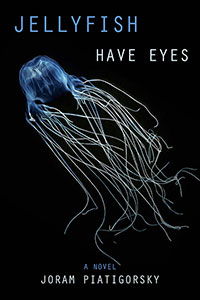
Piatigorsky (The Speed of Dark, 2018, etc.) offers a speculative novel about a researcher undertaking a pure-knowledge scientific study in an era of hostility to free inquiry.
Financial collapse in the near future has left the United States with a huge unemployment rate, new diseases appearing and old scourges returning, more conservatives in Congress, and a rabble-rousing Washington, D.C., reporter slamming taxpayer spending on any research that doesn’t promise immediate, practical payoff. In the 2040s, researcher Ricardo Sztein is an aged, respected fixture at the Vision Science Center who is shaken after his wife’s cancer death. He embraces his other great love—science experimentation just for the sake of knowledge, not a dictated agenda or financial return. His curiosity about how jellyfish see with multiple eyes (“rhopalia”) of unexpected complexity sends him to the swamps of Puerto Rico, supported by like-minded colleagues and a loan of NASA computer tech. Clues uncovered in his field lab hint at new revelations about animal perception and evolutionary biology. But when his rambles become publicly known, grandstanding politicians and media condemn him, cuing a public tribunal that’s reminiscent of that in the film Inherit the Wind. Piatigorsky is a scientist and essayist, so he knows of what he speaks regarding the cloistered realm of modern inquiry and exploration, which includes people jockeying for grants with ambition masked by professional etiquette. He also expresses scientists’ angst that average citizens appreciate nothing about basic research and could pull the plug on it at any moment. The future that the author evokes in this high-minded, speculative drama is thinly sketched, but what readers do glean about it is unpleasant, indeed. The jellyfish material, meanwhile, seems fanciful, but it’s firmly based in fact; the author includes photographic illustrations here that shore up the science. Still, it’s an intelligent, wistful rumination on the value of scientific pursuit, the joy of discovery, and the loneliness of a maverick thinker. A sensitive drama about an aged scientist in an anti-intellectual era.
–Kirkus Reviews


